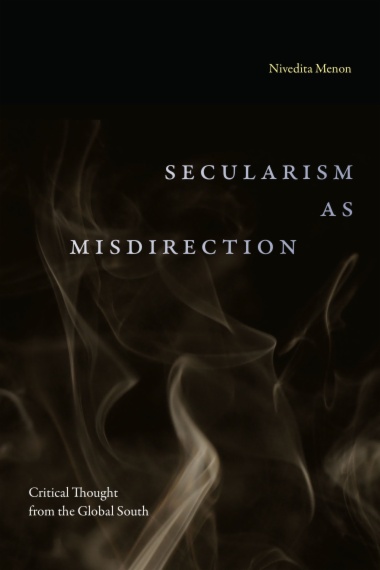In Secularism as Misdirection, Nivedita Menon traces how the discourse of secularism fixes attention to and hypervisualizes women and religion while obscuring other related issues. Showing how secularism is often invoked to serve capital and antiminority politics, Menon exposes it as a strategy of governance that is compatible with both democracy and authoritarianism, capitalism and socialism. Secularism also delegitimizes the nonindividuated nonrational self, Menon argues; exploring this aspect, she tracks the journey of psychoanalysis in the global South. Menon further examines the interconnectedness of religion, caste, the state, and women, showing how the discourse of secularism can also be mobilized by Hindu supremacist politics in India. Menon puts Latin American decolonial theorists in conversation with Asian and African thinkers to examine twenty-first-century global reimaginings of selfhood, constitutionalism, citizenship, and anticapitalist existence. Through a feminist and global perspective, Menon suggests that transformative politics is better imagined by stepping out of the frame offered by secularism and focusing on substantive values such as democracy, social justice, and ecological justice.
- Cover
- Contents
- Acknowledgements�����������������������
- Introduction: Thinking Secularism from the Global South
- Thinking from the Global South�������������������������������������
- Critique of Eurocentrism�������������������������������
- Asia as Method���������������������
- Spirituality and Decolonial Thinking�������������������������������������������
- Unpacking West and Non-West����������������������������������
- “Other” Conceptual Traditions and the Question of Translation
- Secularism as Misdirection—A Map of the Book���������������������������������������������������
- 1. State, Religion, and the Bodies of Women
- Hindu Supremacism as Secularism in India�����������������������������������������������
- French Secularism as Majoritarianism�������������������������������������������
- Secular/Secularisation�����������������������������
- Multiculturalism�����������������������
- Challenges to Secularism as a Neutral Category�����������������������������������������������������
- The State Determines “Religion"
- The United States of America�����������������������������������
- France�������������
- India������������
- Can Bharat Mata Enter the Sabarimala Temple?
- The Uniform Civil Code�����������������������������
- Religious/Caste/Race Identity and Secular Politics���������������������������������������������������������
- A Hindu Left?
- Postsecularism Debates in the Global North—Read from the South
- 2. Hindu Majoritarianism and the Construction of Religion
- The Hindu Rashtra as a State Project�������������������������������������������
- The Majoritarian Politics of Numbers and Religious Conversions
- “Reconversion” and “Inter-denominational” Conversion�����������������������������������������������������������
- Essential Religious Practice�����������������������������������
- Religious Institutions as Income-generating Entities�����������������������������������������������������������
- Religious Institutions/Deities as Juristic Personalities���������������������������������������������������������������
- Global Hindutva����������������������
- 3. The Failed Project of Creating Hindus
- Savarkar’s Imagined Hindu Nation���������������������������������������
- The Puranas������������������
- The Violence of Brahmin Expansion����������������������������������������
- Who Are Hindus?
- Adivasi-Dalit-Bahujan Counternarratives to Hindutva����������������������������������������������������������
- Dalit Bahujan Adivasi Goddesses��������������������������������������
- Hinduism and Hindutva����������������������������
- 4. The Self and Psychoanalysis from the Global South
- Ideas of the Self������������������������
- Psychoanalysis as Culture: China, Japan, and Buddhism������������������������������������������������������������
- Psychoanalysis as Culture: Arabic and Islam��������������������������������������������������
- Psychoanalysis as Culture: A “Hindu” Landscape�����������������������������������������������������
- Secularism as Standardisation������������������������������������
- Secular Psychotherapy, Religious Faith, and Healing the Self
- The Other in the Analyst’s Chair���������������������������������������
- Global South as Analyst, Not Analysand���������������������������������������������
- Historicising “Myth"
- 5. Capitalism as Secular Science
- The Construction of Nature���������������������������������
- The Secular Reason of State����������������������������������
- Capitalism versus Religious Sectarianism�����������������������������������������������
- Coronacapitalism in India��������������������������������
- Data Capitalism and the Aarogya Setu App�����������������������������������������������
- The Sethusamudram Ship Canal Project�������������������������������������������
- Natural or Man-made? Secularism versus Hindutva������������������������������������������������������
- Natural or Man-made? Environment versus Development
- Religious Belief and Science on Trial��������������������������������������������
- Land Rights for Women as a Capitalist Agenda���������������������������������������������������
- Land Struggles in India������������������������������
- Land Rights Through Custom and Tradition in India��������������������������������������������������������
- Women’s Rights to Land in Personal Laws����������������������������������������������
- Forests and Community Rights�����������������������������������
- Customary Laws and Women�������������������������������
- Property Titling for Capitalist Transformation�����������������������������������������������������
- Individual Rights to Land and Land Acquisition�����������������������������������������������������
- 6. Insurgent Constitutionalism and Radical Frames of Citizenship
- Insurgent Constitutionalism—Chile and India��������������������������������������������������
- Chile������������
- India������������
- Pathalgadi�����������������
- Constitution-as-Commons versus Populism����������������������������������������������
- Citizenship������������������
- Are Citizenship and Citizenship Rights Unambiguously Empowering?
- Why Is Citizenship a Feminist Issue?
- Should We Not Cast Citizenship Rights Within the Frame of Place of Work, Not Place of Birth?
- Citizenship and “Non-Secular” Identities�����������������������������������������������
- 7. Reshaping Worlds—Beyond the Capitalist Horizon
- The Universal Basic Income Debates�����������������������������������������
- Universal Basic Income—An Anti-capitalist Critique���������������������������������������������������������
- Towards Escaping a Capitalist Horizon��������������������������������������������
- Rewilding����������������
- Conflict Between Dalit and Ecological Concerns?
- Life Itself—The Virus and the Human������������������������������������������
- The Problems with “Green Energy"
- Degrowth, the Pandemic, and Radical Change�������������������������������������������������
- Food and Land Sovereignty��������������������������������
- Commoning����������������
- Pirate Care������������������
- Escaping the Rulers��������������������������
- Utopia, the “Outside,” and Solidarity��������������������������������������������
- Bibliography�������������������
- Index������������
- A
- B
- C
- D
- E
- F
- G
- H
- I
- J
- K
- L
- M
- N
- O
- P
- Q
- R
- S
- T
- U
- V
- W
- X
- Y
- Z

